Recently, I got to explore and understand the wonderful work being done by a philanthropist in his native rural area. The organisation was working across multiple domains – from sports to theatre for development, skill building and livelihood, agricultural information services, women empowerment, pre-school support, etc.
As per habit (the dangers of having been a consultant!), my first question to them was related to understanding their theory of change (TOC – a sense of what the problem is and what interventions are needed to solve those problems) and trying to figure out why they had chosen these domains and what their imagination of impact was. My host looked at me in a very amused manner and commented that folks in the social sector are obsessed with writing reports. And since he is not obliged to report to anyone, he has never thought about things in this manner or even considered evaluating his work.
The ‘main strategy’ here is not to have a very detailed one – to go with the flow of things and do interventions which make sense on an intuitive level – with the belief that at some level, at some time, some kind of impact will definitely take place, whatever that might be.
This really got me thinking about whether we were complicating (and corporatising?) an otherwise intuitive process while talking about TOC, trying to formulate causal relationships (that is, what parameters need to be worked on in which manner to achieve the desired social impact), looking at things from a more systems standpoint and working on defining and evaluating impact/change. Or, was this intuitive process really over-simplified where it does not do any justice to the social, cultural, political, economic inter-linkages and dynamics which constitute social change? I do not have a clear-cut right answer – but I am guessing it lies in between these two extremes.
These approaches also possibly represent the differences between a ‘charity-based’ and a ‘philanthropic’ approach to development, some of which are represented below. Do note that these may not be applicable in all situations.
Given the changing paradigms of the development sector and a lot more funding coming from professional high net-worth individuals and corporates, there is an increasing trend of moving towards a more strategic philanthropy-based model of work. This would necessitate a change in the way social sector organisations conceptualise, approach, plan and deliver their work.
This will only be possible if we have more and more people (development managers and leaders) who can bring this rigour and structure to the work being done. To avoid rigidity, it is important to combine this rigour with the openness and adaptability to changes in the external environment.




